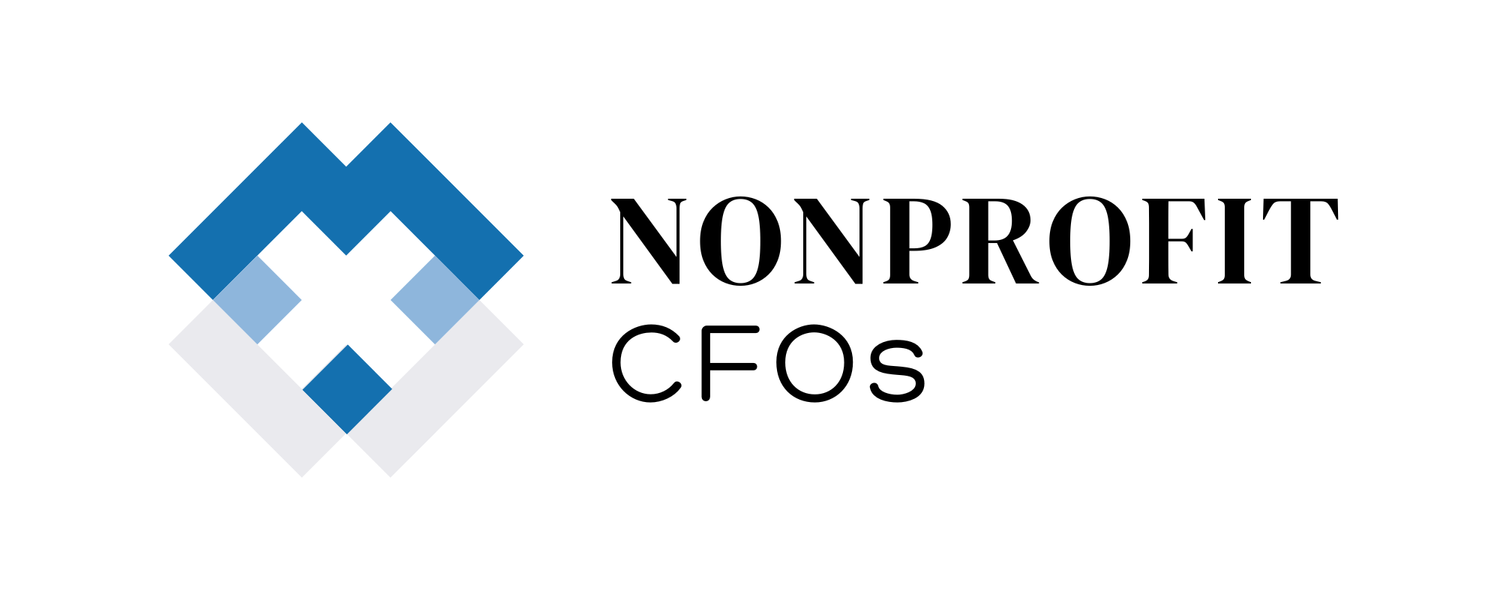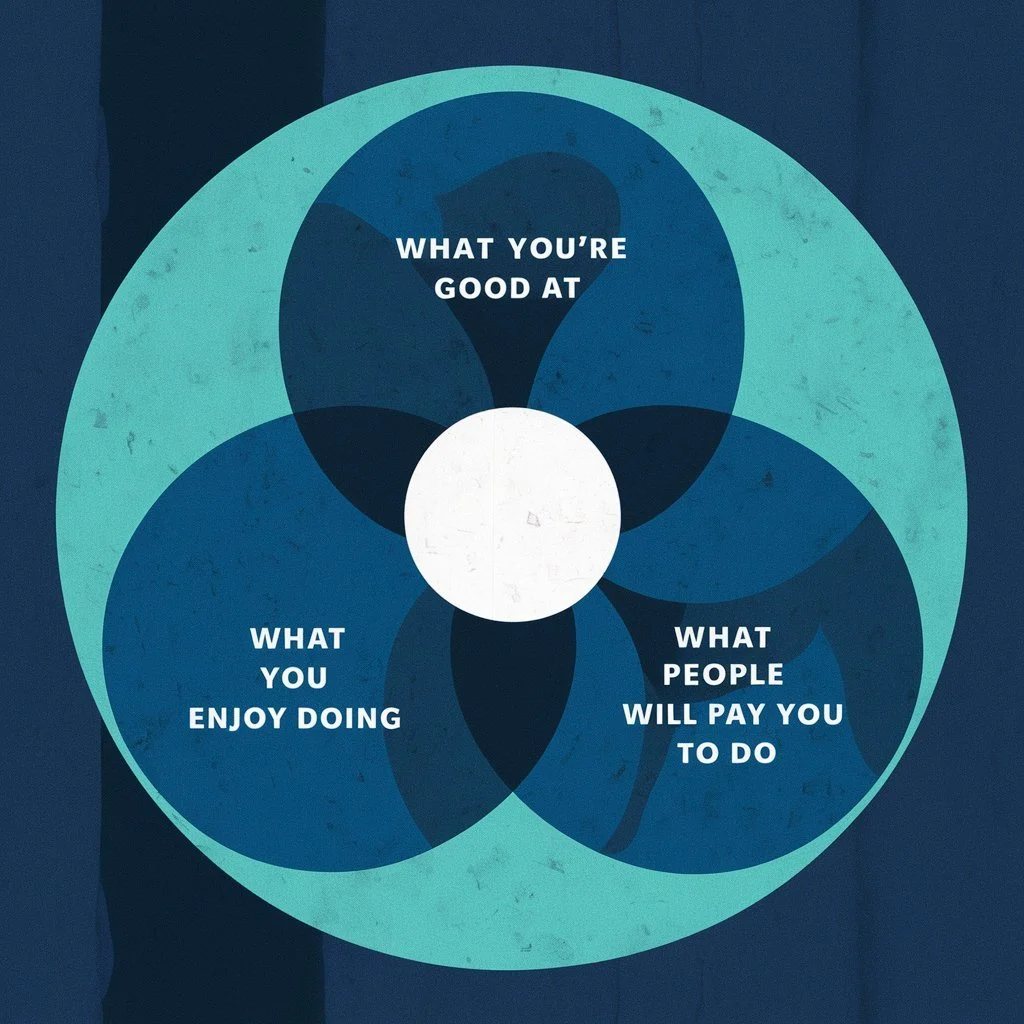Starting a Consulting Business
People regularly ask me whether they should get into consulting.
I have no idea of whether it’s the right career move for you, but I’m happy to share below the lessons I’ve learned.
What services should you offer? (figuring out your hedgehog concept)
Jim Collins in his famous book talks about figuring out your hedgehog concept. That is the intersection of what you're good at, what you enjoy doing, and what people will pay you to do.
Have you figured out your hedgehog concept yet? Or do you at least have some ideas? That was my first step. It took me several years to figure it all out.
All of the business literature will tell you to go narrow and go deep. But that is difficult on day one especially if you have not figured out your hedgehog concept yet. I certainly hadn't.
So, I cast my net wide. For the first year I thought I would not just do financial management for nonprofits but also related services where I had skill and experiences such as operations, light human resources, light technology, and other things.
Over time I saw that what people really sought us out for, and what they really valued, was financial management expertise. So, beginning around year two I narrowed the offerings listed on our website and after year four I even rebranded to a new name to reflect our very focused services.
What makes that focus so important?
So that you can be an expert and deliver services at a very high level. Your clients expect you to be able to come in and do the work well. You cannot be a jack of all trades because that will make you a master of none.
So people will remember you and what you do (because you’re lucky if someone will remember just one thing you do; very few will remember more than that).
In our case we even started saying no to services that we knew others in the field could do much better at a better price such as long-term bookkeeping. Long-term bookkeeping is a great business model however we could not build that and fractional CFO services and other services all at the same time. Doing any one of those with excellence requires a level of focus, discipline, and time investment that we could not do in multiple areas all at once.
What is your industry focus?
My industry focus has been, and I expect will continue to be, non-profits. After all, I built my career in nonprofits for more than 20 years before becoming a consultant.
Discovering, confirming, and leaning into your industry focus should help you really nail your hedgehog concept. You might find this difficult at the beginning if you have experience in a variety of industries, but the more that you specialize, the more your peers and your potential clients will recognize you as a subject matter expert. That should lead to more of them seeking you out and them being willing to pay you a good rate for your expertise and experience.
What size of client?
Clients typically expect a consultant to be able to get to work with minimal support or on-the-job learning.
So, the work that I’ve personal performed as a consultant has been for organizations of similar or smaller budget and employee sizes to those that I served as an employee. The same has held mostly true of my affiliate consultants, though in a few cases we’ve placed them in non-leadership roles in larger organizations.
In almost every case, we’ve aimed for projects where we could perform at a high level, doing work that required little to no learning curve. In those few cases where the consultant had a meaningful amount to learn, we always made sure that the client knew about it from the beginning.
Single shingle or team? Or refer out?
You don't need to answer this question right away. In fact, most consultants will start off on a single shingle basis meaning that they are the sole practitioner and they do all of the work, including business development, marketing, delivering the work, and everything in between.
Eventually, if you do good work then the number of hours clients ask you to work will exceed your ability to deliver the work personally. What do you do then?
In my case, I started early, almost by accident, building a strong network of peers. Some of those peers were people that I could refer work to, some were potential collaborators, some were potential affiliate subcontractors.
Even if all you do is refer the work out, rather than working through employees or subcontractors, that will build your credibility with your clients. If your client or a potential client reaches out to you, you always want to send them away with an option. That’s especially true if you are not in a position to deliver the service yourself.
Referrals can be especially nice for those clients that are not your ideal client even if you have the time and skills to work for them. Once you get a year or two into consulting, and you have a full book of business, having some people you can refer work to can be a win-win for everybody.
Building your peer network
On a similar note, do you have a network of peers who are several more years further along building their consulting practices? Those people might be happy to share certain opportunities with you that aren’t a good match for them.
Collaborators can be another way to go in building your process and practice. Those potential collaborators can help you take on a project that is bigger than you might have the time for or a project where you might not have all the skills that your potential clients seek. Or you might even have the skills but there are parts of the project that you know you just won't enjoy. So this is another reason to build up your peer network.
Of course, my preferred model is affiliates (AKA subcontractors). Affiliates have expanded my ability to impact nonprofits far beyond what I could do or even two or three of me could do working full-time.
Financially this might feel scary at the beginning because you're giving away a significant part of the revenue from a contract. However, if you enjoy managing people and doing the other parts of the job like business development, this can allow you to significantly multiply your impact over time.
What to name your consulting practice?
A friend who is a nonprofit marketing expert recommended I begin with just my name: “Sean Hale Consulting.” She explained that especially at the beginning, people’s trust in me, and their familiarity with me, would be the practice’s greatest asset. To top it off, while I had some ideas of what my hedgehog concept would look like, I didn’t have the experience yet to know which would get the best results.
It turned out that she was right on multiple levels. I couldn’t have guessed on day one how my consulting practice would evolve, especially over the first two years. In fact, it wouldn’t have even been on my list of most likely outcomes.
By the end of year two I had lots of clarity and the next two years reinforced it.
Beginning in 2022, I started buying the URLs of plausible new business names. I wanted something that reflected who we are, what we do, and our highest aspirations. It also had to be short and memorable.
Over the fall of 2023, I got guidance from some marketing and branding professionals. Then I engaged the team, clients, and my LinkedIn followers to help narrow down the finalist names. This approach did more than help me pick the best option. It also helped increase buy in, build excitement, and jump-started the announcement process (because you must communicate a new business name many times for it to stick).
As of Spring 2024, as I write this, I’ve done about 80% of the rollout. Ideally it would have all happened in a very intentional, well-planned way, but if I let perfect be the enemy of the good I never would have gotten past the first step.
Of course, if you have your hedgehog concept clear from the beginning, and have confidence that strong demand exists for it, then pick a name that reflects that.
What about business partnerships?
Starting a business with partners is a bit like starting a business with family: when it’s good, it’s very good; when it’s bad, it’s very bad.
I had good luck with the one business partnership I’ve participated in, it strengthened the friendship, and we built something that neither of us could have done independently. At the same time, I also gained a strong awareness of what makes or breaks a business partnership by watching ours and that of colleagues.
I learned that for a consulting partnership to succeed requires both people to have very strong alignment on such things as priorities, values, level of commitment and engagement, how conflicts get managed, appetite for risk and more. It also requires an unusual degree of maturity, communication skills, time commitment to cultivating the relationship, and mutual respect.
Partnerships face many challenges along the way that sole proprietors do not:
One partner not pulling their weight
One partner investing more time, treasure, and/or talent than the other (leading to resentments)
One partner having life changes that reduce their ability to involve themselves as much in the business
One partner losing their appetite for risk and returning to W-2 employment
Plus all the disagreements that people can have about money, priorities, and dozens of other things
Unwinding a business partnership at that point can be complicated:
What happens to the assets?
What happens to the profits?
What happens to the business name?
What happens if the other person no longer behaves as reasonably and collaboratively as they used to?
In most cases that I’ve seen, the risks and downsides far outweigh the benefits.
That’s especially true when you can have most of the benefits of a formal partnership without the downside of a long-term financial entanglement. For example, two legally independent consulting practices can:
Collaborate as partners on a project
Support one another as they build their practices, including sharing information, brainstorming, serving as sounding boards, and the like
Refer potential clients to one another
Just as I would encourage two love birds to date for a few years before making the much larger commitment of marriage, I encourage you to follow the same path with your consulting practice. If you and a friend want to work together, you can do that without being under the same legal roof. That’s doubly true while you’re both learning the ropes of consulting. After you’ve both run your businesses for a few years, and you’ve done a variety of projects together, you’ll have a much better sense of whether or not a formally merged consulting practice would be stronger than the sum of its parts.
Until then, I encourage you to enter into a formal business partnership only with great care and caution.
How long does it take to become profitable?
Everyone will have a different experience. Almost everyone will have moments of worry and doubt.
I’ve observed that most people who build successful practices feel a full wind in their sails after about twelve months.
In my case, it took about fourteen months but I also got started about 10 weeks before the COVID pandemic started, so I could only guess how things would have turned out otherwise.
Some people give it their very best for a year or two, only to learn that they can’t achieve their target income for some reason.
And I do know one consultant who achieved a full book of business just a few weeks after getting started. He was already very well-known and respected as a consultant in his industry, so the switch from working for someone else to working for himself proved nearly seamless.
If you can start working with one or two clients before you leave your day job, you can test the waters and begin learning the ropes while minimizing your risk.
Helpful books
The E-Myth Revisited by Michael Gerber – Easy-to-read, classic book about running a small business.
The E-Myth Accountant by Michael Gerber and Darren Root – Building on the previous book. Although it focuses on accounting practices, many of the lessons would apply to any consulting practice.
Good to Great by Jim Collins – a classic book about what it takes to build a truly great business. Although this book focuses on large corporations, many of the lessons also apply to small businesses and consulting practices.
Other helpful resources
So here are some things I've put together to lend a hand to all the folks and respond to their frequently asked questions:
Check my main blog. Lots of good material there.
Check my LinkedIn feed. Lots of good free material there too.
I do a quarterly webinar for setting up your consulting practice through Consultants for Good, here.
My blog post on transitioning to the nonprofit sector, here.
My video on basics for setting up your consulting practice, here.
This list of tools and resources I've created for starting your consulting practice.
Elizabeth Schuster has a great LinkedIn post about her non-traditional approach to networking in a new city. It looks like a great road map, even for people who hate traditional networking.
Relatable Nonprofit has provides coaching to people setting up their nonprofit consulting practice and free tools to help you discern if consulting is right for you.
Alex Pratcher’s blog on networking provides great tips on building relationships that lead to referrals without it feeling icky.
Depending on your specific situation, you may want to check out these networking resources:
Consultants For Good, a national nonprofit consultant networking group
Fractionals United - a peer group for fractional professionals across industries
If you're building a fractional practice, I've found these podcasts to be helpful. Much of their content will apply outside of finance and accounting:
Build a Focused Firm with Hector Garcia





